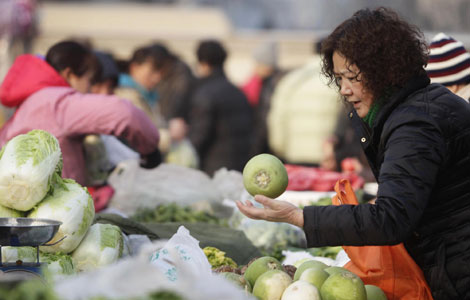Economy
China's inflation rises as food costs surge
Updated: 2011-02-15 15:06
(Agencies)
 |
|
A woman selects aturnip at a morning market in central Beijing February 15, 2011. China's consumer prices rose 4.9 percent in the year to January, a weaker-than-expected reading after the government adjusted the weightings in the CPI basket. [Photo/Agencies] |
BEIJING – A double-digit jump in food prices pushed China's inflation higher in January, adding to pressure on Beijing to cool living costs with more interest rate hikes and other measures.
Consumer prices rose 4.9 percent, driven by a 10.3 percent jump in food costs, data showed Tuesday. That was up from December's 4.6 percent rate and close to November's 28-month high of 5.1 percent.
Beijing has hiked interest rates three times since October to cool rapid economic growth and tamp down inflation. But analysts say it needs to do more to curb soaring bank lending while it also tries to increase food supplies to bring down prices.
"The government is battling with all sorts of problems coming from every front," said Standard Chartered economist Jinny Yan. "The peak of inflation is yet to be seen."
The government has set a 4 percent inflation target this year, but private sector analysts expect up to 6 percent, which would include an even sharper rise for food.
In January, the price of fresh fruit soared by 34.8 percent over a year earlier, while eggs rose 20.2 percent, the National Bureau of Statistics reported.
Adding to a squeeze on food supplies, China's wheat-growing northeast is in the grip of a severe drought that threatens its crop. Beijing has launched a $1 billion emergency campaign of cloud-seeding and expanded irrigation.
Analysts expect at least two more rate hikes by midyear but say monetary policy alone cannot resolve China's economic challenges.
"Inflation is unlikely to come down substantially in the first half of the year," said Mark Williams of Capital Economics. Rate hikes alone "aren't going to bring more crops to the markets."
Inflation could spill over into higher Chinese export prices. That might raise costs for Western consumers but also could help countries such as Vietnam and India compete with China as suppliers of clothing, furniture and other low-cost goods.
Global Sources, a company that connects Chinese suppliers with foreign customers, said this week that a survey of 232 Chinese companies found 74 percent of them raised prices last year — some by up to 20 percent — due to higher costs for materials and components.
A separate Global Sources survey of 385 foreign buyers last month found 31 percent were increasing purchases from Vietnam due to higher Chinese prices.
E-paper

Ear We Go
China and the world set to embrace the merciful, peaceful year of rabbit
Preview of the coming issue
Carrefour finds the going tough in China
Maid to Order
Specials

Mysteries written in blood
Historical records and Caucasian features of locals suggest link with Roman Empire.

Winning Charm
Coastal Yantai banks on little things that matter to grow

New rules to hit property market
The State Council launched a new round of measures to rein in property prices.
